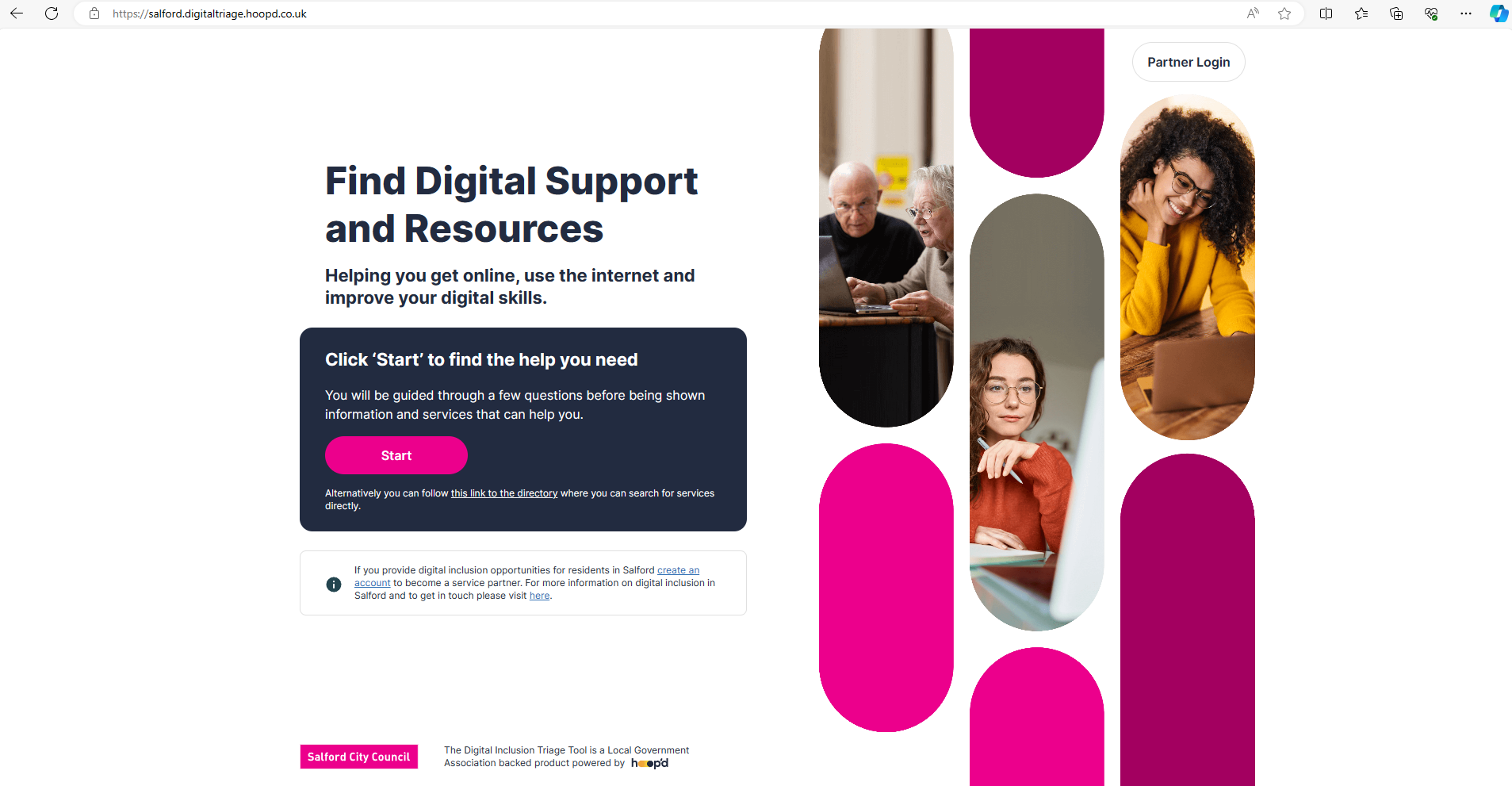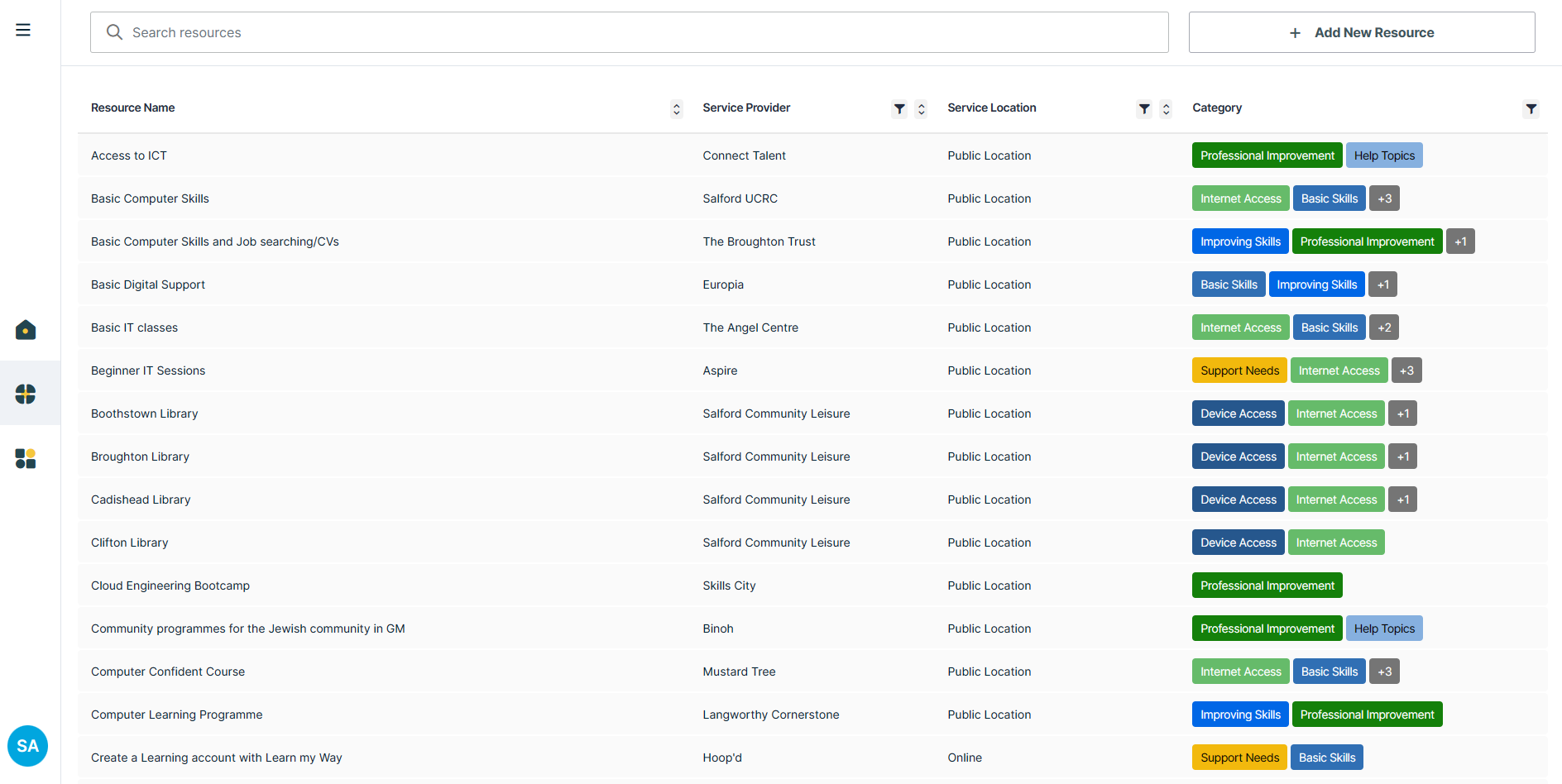Find Digital Help in Salford City Council
'Find Digital Help' is a tailored version of our Digital Inclusion Triage Tool for Salford City Council. The tool enforces Salford's committment to creating a better and fairer Salford, helping residents become better off by focusing on early intervention to achieve the right outcomes for individuals, families and businesses. Digital inclusion is central to this strategic aim and makes 'Find Digital Help' a core element in the delivery of their offer to Salford's citizens.
Modules
| Module | Description |
|---|---|
| Global API | Provides the user with resources from our national digital inclusion directory as well as from their local area directory |
| Directory management | Enables the administrator and service partners to add and manage their local offer resources and build a local area directory |
| Account creation | Enables the operation and management of a service provider network and gives service providers the ability to create resources on the local area directory |
| Data visualisation | Provides the product owner with access to the tool's dataset and a tailored view of selected subsets |
| User triage | Assesses the needs of the user and applies our customised digital inclusion algorithm for delivering recommended resources |
Leading digital inclusion partnerships
Salford City Council are the lead partner in the development and implementation of our Digital Inclusion Triage Tool. A Local Government Association backed product for creating customised digital inclusion programmes and networks. The tool offers a custom environment for assessing the needs of users and signposting them to recommended pathways and services for support.
Why does Salford City Council need support?
The pandemic caused a seismic shift in highlighting the nation’s need for digital devices, digital connectivity and digital skills. In Salford, a clear target operating model achieved tremendous results in forging a 'social movement' around digital inclusion, establishing a Digital Providers Network consisting of 79 local organisations, all delivering different resources in response to the city's needs. However, what was needed was a way in which to address the key design principles essential to combatting the barriers that digitally excluded residents experience such as poverty, unemployment, and homelessness. These design principles include:
- The creation of new pathways and partnerships to enhance human interaction and strengthen relationships
- The use of data and intelligence to maximise the potential of systems and networks to deliver the right intervention at the right time


Creating and maintaining local area directories
Find Digital Help utilises our global API system to provide national, accredited resources alongside Salford's own local area directory. This combination of different types of resources alleviates pressure on the development of local area directories, offering a variety of pathways for supporting digital inclusion already present and effective before local area resources are developed. This is enabling us to support the growth and sustainability of local area directories in Salford as well as across all our associate partners.
For managing Salford's local area directory the Hoop'd framework on which the tool is built offers a range of modules and automations to consistently monitor and maintain the health of the directory overall. As a webservice the tool also offers Salford access to transformative technology for sharing information and resources across departments, saving time and effort in the management of local area information.
Monitoring the impact
Find Digital Help has reduced front-line service pressure and workload in supporting the 10% of Salford's population that lack the essential digital skills needed to access services. The time savings using the tool amount to over 26 hours a week with a cost saving of over £19k per locality. In addition the tool is reducing staff stress levels by 40% and increasing confidence in signposting and referral by 22%.
As we continue to monitor the impact of the tool in reaching excluded residents and improving digital skills we will also assess the value of the tool's dataset and explore ways in which it can complement and enrich Salford's use of the Digital Exclusion Risk Index (DERI) to better target digital inclusion interventions and make stronger business cases for local area investment into digital devices, connectivity and digital skills.
Interested in digital inclusion initiatives?
If you found this use-case of interest please get in touch. We love exploring new implementations of our Digital Inclusion Triage Tool. Whatever stage you are at in exploring digital inclusion please get in touch to see how we could help to improve your initiatives, networks, services and systems.